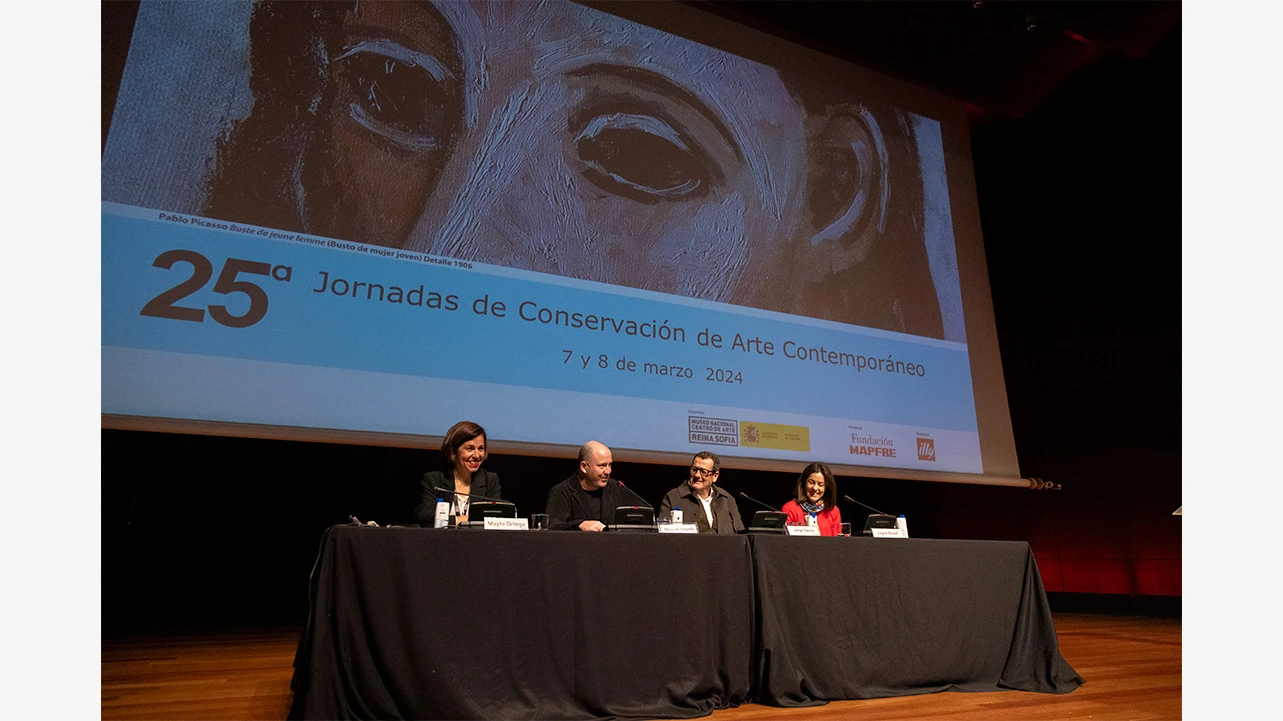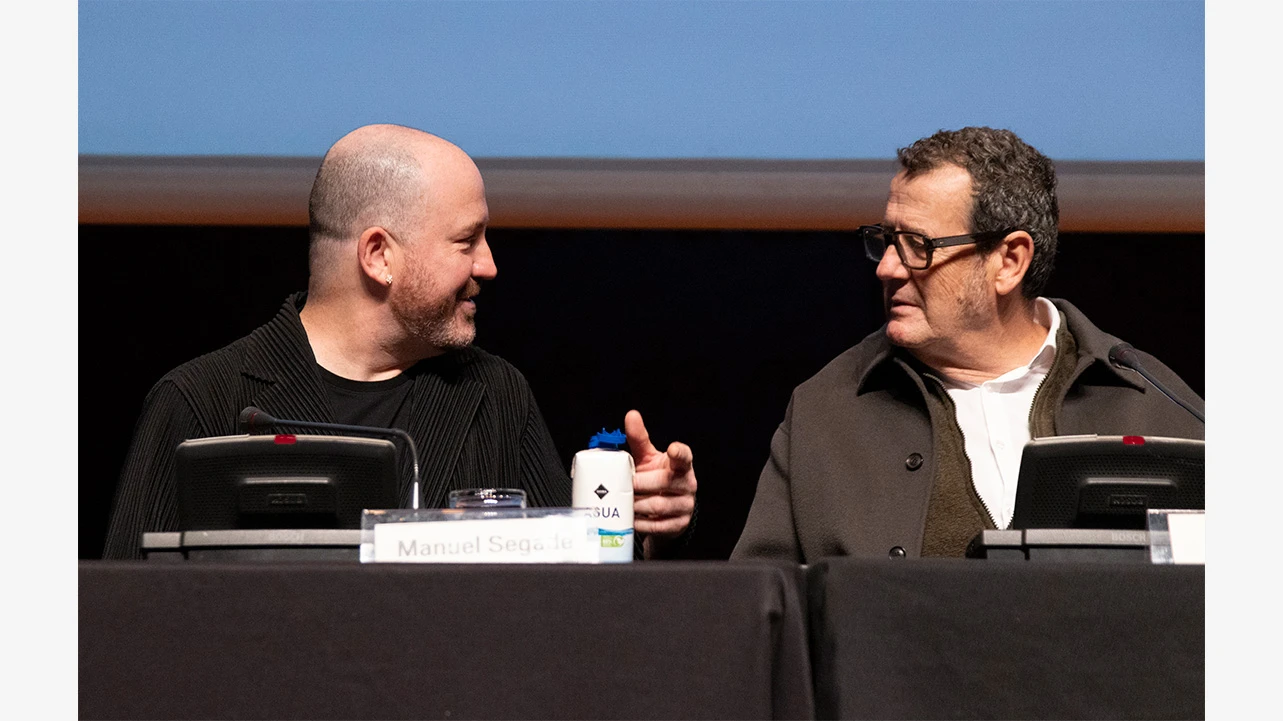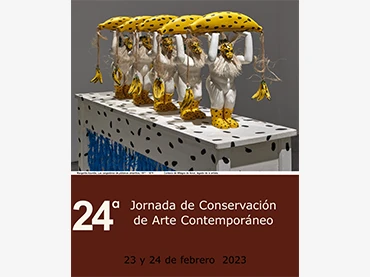-
Thursday, 7 March 2024
09:45am Opening and Presentation
Manuel Segade (director of the Museo Reina Sofía), Jorge García Gómez-Tejedor (head of the Museo Reina Sofía’s Department of Restoration), Mayte Ortega (coordinator of the 25th Contemporary Art Conservation Conference) and Leyre Bozal (collections conservator from the Culture Department of the MAPFRE Foundation)10am The Study and Restoration of Pablo Picasso’s Buste de jeune femme (Bust of a Young Woman, 1906)
Paloma Calopa, Ana Iruretagoyena, María Barra and Humberto Durán (Museo Reina Sofía10:30am The Decision-making Process in Treating a Fungal Attack on a Contemporary Work by the Artist Silvestre Moros
Carmen Estrela Monreal, Mª Pilar Bosch Roig, Laura Silvestre García, Laura Fuster López (Universtat Politècnica de València)11am The Back of Contemporary Paintings: Analysing the Impact of the Accumulation of Gaseous Pollutants on the Resulting Microclimate
Daniel Morales-Martín (Complutense University of Madrid), Mayte Pastor Valls (Servei de Restauració de la Diputació de Castelló) and Alicia Sánchez Ortiz (Complutense University of Madrid)11:30am Coffee break
12:15pm The Restoration Process on a Ceramic Mural by Arcadio Blasco from the Artistic Heritage of the Autonomous University of Madrid
Joaquín Barrio Martín, Amaia Aldazabal, Marian Díaz, Susana López Ginestal (the Service of Conservation, Restoration and Scientific Studies of Archaeological Heritage - SECYR, Autonomous University of Madrid)12:45pm Multispectral 3D Digitisation Robot
Daniel Vazquez-Moliní, Francisco Luna García, Izan Morón Herrero and Antonio Álvarez Fernández-Balbuena (Complutense University of Madrid), Antonio J. Benítez (Carlos III University of Madrid), David Alonso Urbano (University of Design, Innovation and Technology), Jorge García Gómez-Tejedor (head of the Museo Reina Sofía’s Department of Restoration) Humberto Durán Roque (HDURAN.com)1:15pm Instituto Inhotim de Brasil: The Challenges of Exhibition and Conservation in the Largest Open-air Contemporary Art Museum in Latin America in the Heart of Brazil
Presentation and talk with Bruna Oliveira, Elaine Matos, Carlos Soares, Paulo Rodrigues, Thiago de Pinho Botelho, Álisson Valentim and Alex Maciel (Instituto Inhotim). Moderated by: Arianne Vanrell Vellosillo (Museo Reina Sofía)2pm Break
4pm Documentation and Appraising the Sugoi Zirkoa Collective. Memory of the Contemporary Circus
Rosalina Nespral, a conservator and restorer of cultural heritage, specialised in contemporary art4:30pm Consolidation Proposal for Matte Pictorial Surfaces
Iris Hernández Altarejos, Julia Osca Pons, Mª Pilar Soriano Sancho and José Luis Regidor Ros (Universtat Politècnica de València)5pm Recovering Photographs after the Flood: the Archive of Photographer Bob Wolfenson
Juliana Bittencourt Bovolenta, Leandro Melo, Fernanda Cicero de Sá, Talita Rennó Bruno, independent photograph conservators5:30pm Juan Manuel Sánchez Ríos and His Ceramic Mural in Plaza de la Remonta in Tetuán (Madrid). Vindicating the Origins of a District and a Conservation and Restoration Proposal
Dulce Galán Herrador, who holds a degree in Cultural Heritage Conservation and Restoration6pm Conclusion
-
Friday, 8 March 2024
10am Joan Miró’s Creative Process in his Paintings: Underlying Drawings and Re-used Works
Elisabet Serrat (Joan Miró Foundation, Barcelona), Javier Becerra Luna (Pablo de Olavide University, Seville) and Anna Vilà Espuña (“La Caixa” Foundation, Barcelona)10:30am The Study of and Intervention with Polystyrene Resin on the Contemporary Work La medalla de la madre (Mother’s Necklace, 1978), by José Luis Zumeta
Eva Luna Ezkurra León, Erika Tarilonte, Enara Artetxe Sánchez, José Luis Larrañaga Odriozola, Ilaria Constantini (University of the Basque Country / Euskal Herriko Unibertsitatea)11am Evaluation as a Key Tool in Conserving Documentary and Museum Holdings
Pedro García Adán (Museo Reina Sofía)11:30am Coffee Break
12:15pm Memory and the Work of Time
Gabriella Locci and Dario Piludu (Casa Falconieri, Italy)12:45pm A 1970 Work by Enric Pladevall-Vila Using Rubber Material
Natalia Portabella Macchi, an artwork conservator and restorer1:15pm Evaluating Systems to Protect Corten Steel Sculptures: Chromatic Alteration and its Role in the Opinion of the Artist and Conservator-Restorer
Sara de Miguel and Emilio Cano (the National Centre for Metallurgical Research - CENIM), Silvia García Fernández-Villa (Complutense University of Madrid)1:45pm Final Note and Conclusion

25th Contemporary Art Conservation Conference, 2024. Pablo Picasso, Bust of a Young Woman (detail), 1906. © Sucesión Pablo Picasso, VEGAP, Madrid, 2023
Held on 07, 08 Mar 2024
The 25th Contemporary Art Conservation Conference, organised by the Museo Reina Sofía’s Department of Conservation-Restoration, with the sponsorship of the MAPFRE Foundation, is held on 7 and 8 March 2024. This international encounter sets out to share and debate experience and research, open new channels of study and reflect on conservation and the professional practice of restorers.
Two attendance formats are available for the conference:
- In-person: this attendance format costs 20 euros and includes in-person attendance on both days, coffee during the scheduled breaks, an attendance certificate (subject to attendance on both days) and free access to the Museo Reina Sofía on 7 and 8 March 2024.
- Online platform: this format is free of charge but does not include either an attendance certificate or free access to the Museo Reina Sofía on 7 and 8 March 2024. Those who have registered will receive a link to the online platform on 6 March 2024 to follow the live broadcast of the conference.
Over the course of the conference, speakers will give twenty-minute presentations, followed by five-minute Q&As.
Sponsor
The Mapfre FoundationSubmitting proposals (closed)
The deadline for presenting proposals ends on 15 October 2023. Those interested must send an email to jornada.conservacion@museoreinasofia.es, submitting the following documents:
- An unpublished proposal related to the conservation or restoration of contemporary art.
- A 1,700-word summary, written in Word, on the theme addressed. Please indicate the topic at the top of the document with five keywords and the presentation format (in-person or virtual).
- CV and contact details.
Proposals may be submitted in Spanish and English and will be evaluated by a Scientific Committee, which will select the submissions to be presented during these conferences and will determine their possible participation in a subsequent publication, the inclusion of which will undergo a second and definitive evaluation by the Editorial Committee.
For submissions in a virtual format, participants must send a recording following certain technical requirements they will receive once participation is confirmed.






Más actividades

Difficulty. Forms and Political Effects of Deviation in Writing and Contemporary Art
23 February – 14 December 2026 – Check programme
Difficulty. Forms and Political Effects of Deviation in Writing and Contemporary Art is a study group aligned towards thinking about how certain contemporary artistic and cultural practices resist the referentiality that dominates the logics of production and the consumption of present-day art. At the centre of this proposal are the concepts of difficulty and deviation, under which it brings together any procedure capable of preventing artistic forms from being absorbed by a meaning that appears previous to and independent from its expression. By ensuring the perceptibility of their languages, difficulty invites us to think of meaning as the effect of a signifying tension; that is, as a productive and creative activity which, from the materiality of art objects, frees aesthetic experience from the representational mandate and those who participate in it from the passiveness associated with tasks of mimesis and decoding.
The economy of the referential norm translates the social logic of capitalism, where insidious forms of capturing subjectivity and meaning operate. In the early 1980s, and adopting a Marxist framework, poet Ron Silliman highlighted how this logic entailed separating language from any mark, gesture, script, form or syntax that might link it to the conditions of its production, rendering it fetichised (as if without a subject) and alienating its users in a use for which they are not responsible. This double dispossession encodes the political strategy of referential objectivity: with no subject and no trace of its own consistency, language is merely an object, that reality in which it disappears.
The political uses of referentiality, more sophisticated today than ever before, sustain the neoliberal-extractivist phase of capitalism that crosses through present-day societies politically, economically and aesthetically. Against them, fugitive artistic practices emerge which, drawing from Black and Queer studies and other subaltern critical positions, reject the objective limits of what exists, invent forms to name what lies outside what has already been named, and return to subjects the capacity to participate in processes of emission and interpretation.
Read from the standpoint of artistic work, the objective capture of referentiality may be called transparency. Viewed from a social contract that reproduces inequality in fixed identity positions, transparent in this objectivity are, precisely, the discourses that maintain the status quo of domination. Opposite the inferno of these discourses, this group aims to collectively explore, through deviant or fugitive works, the paradise of language that Monique Wittig encountered in the estranged practices of literature. For the political potency of difficulty — that is, its contribution to the utopia of a free language among equals — depends on making visible, first, its own deviations; from there, the norm that those deviations transgress; and finally, the narrowness of a norm which in no way exhausts the possibilities ofsaying, signifying, referring and producing a world.
From this denouncement of referential alienation, fetishisation and capture, Difficulty. Forms and Political Effects of Deviation in Writing and Contemporary Art turns its attention to the strategies of resistance deployed by contemporary artists and poets. Its interest is directed towards proposals as evidently difficult or evasive as those of Gertrude Stein, Lyn Hejinian, Theresa Hak Kyung Cha, Kameelah Janan Rasheed, Kathy Acker, María Salgado and Ricardo Carreira, and as seemingly simple as those of Fernanda Laguna, Felix Gonzalez Torres and Cecilia Vicuña, among other examples that can be added according to the desires and dynamics of the group.
The ten study group sessions, held between February and December, combine theoretical seminars, work with artworks from the Museo Reina Sofía’s Collections and exhibitions, reading workshops and public programs. All these formats serve as spaces of encounter to think commonly about certain problems of poetics — that is, certain political questions — of contemporary writing and art.
Difficulty. Forms and Political Effects of Deviation in Writing and Contemporary Art inaugurates the research line Goodbye, Representation, through which the Museo Reina Sofía’s Studies Directorship seeks to explore the emergence of contemporary artistic and cultural practices which move away from representation as a dominant aesthetic-political strategy and redirect their attention toward artistic languages that question the tendency to point, name and fix, advocating instead for fugitive aesthetics. Over its three-year duration, this research line materializes in study groups, seminars, screenings and other forms of public programming.

Institutional Decentralisation
Thursday, 21 May 2026 – 5:30pm
This series is organised by equipoMotor, a group of teenagers, young people and older people who have participated in the Museo Reina Sofía’s previous community education projects, and is structured around four themed blocks that pivot on the monstrous.
This fourth and final session centres on films that take the museum away from its axis and make it gaze from the edges. Pieces that work with that which is normally left out: peripheral territories, unpolished aesthetics, clumsy gestures full of intent. Instead of possessing an institutional lustre, here they are rough, precarious and strange in appearance, legitimate forms of making and showing culture. The idea is to think about what happens when central authority is displaced, when the ugly and the uncomfortable are not hidden, when they are recognised as part of the commons. Film that does not seek to be to one’s liking, but to open space and allow other ways of seeing and inhabiting the museum to enter stage.

Intergenerationality
Thursday, 9 April 2026 – 5:30pm
This series is organised by equipoMotor, a group of teenagers, young people and older people who have participated in the Museo Reina Sofía’s previous community education projects, and is structured around four themed blocks that pivot on the monstrous.
The third session gazes at film as a place from which to dismantle the idea of one sole history and one sole time. From a decolonial and queer perspective, it explores films which break the straight line of past-present-future, which mix memories, slow progress and leave space for rhythms which customarily make no room for official accounts. Here the images open cracks through which bodies, voices and affects appear, disrupting archive and questioning who narrates, and from where and for whom. The proposal is at once simple and ambitious: use film to imagine other modes of remembering, belonging and projecting futures we have not yet been able to live.

Remedios Zafra
Thursday March 19, 2026 - 19:00 h
The José Luis Brea Chair, dedicated to reflecting on the image and the epistemology of visuality in contemporary culture, opens its program with an inaugural lecture by essayist and thinker Remedios Zafra.
“That the contemporary antifeminist upsurge is constructed as an anti-intellectual drive is no coincidence; the two feed into one another. To advance a reactionary discourse that defends inequality, it is necessary to challenge gender studies and gender-equality policies, but also to devalue the very foundations of knowledge in which these have been most intensely developed over recent decades—while also undermining their institutional support: universities, art and research centers, and academic culture.
Feminism has been deeply linked to the affirmation of the most committed humanist thought. Periods of enlightenment and moments of transition toward more just social forms—sustained by education—have been when feminist demands have emerged most strongly. Awareness and achievements in equality increase when education plays a leading social role; thus, devaluing intellectual work also contributes to harming feminism, and vice versa, insofar as the bond between knowledge and feminism is not only conceptual and historical, but also intimate and political.
Today, antifeminism is used globally as the symbolic adhesive of far-right movements, in parallel with the devaluation of forms of knowledge emerging from the university and from science—mistreated by hoaxes and disinformation on social networks and through the spectacularization of life mediated by screens. These are consequences bound up with the primacy of a scopic value that for some time has been denigrating thought and positioning what is most seen as what is most valuable within the normalized mediation of technology. This inertia coexists with techno-libertarian proclamations that reactivate a patriarchy that uses the resentment of many men as a seductive and cohesive force to preserve and inflame privileges in the new world as techno-scenario.
This lecture will address this epochal context, delving into the synchronicity of these upsurges through an additional parallel between forms of patriarchal domination and techno-labor domination. A parallel in which feminism and intellectual work are both being harmed, while also sending signals that in both lie emancipatory responses to today’s reactionary turns and the neutralization of critique. This consonance would also speak to how the perverse patriarchal basis that turns women into sustainers of their own subordination finds its equivalent in the encouraged self-exploitation of cultural workers; in the legitimation of affective capital and symbolic capital as sufficient forms of payment; in the blurring of boundaries between life and work and in domestic isolation; or in the pressure to please and comply as an extended patriarchal form—today linked to the feigned enthusiasm of precarious workers, but also to technological adulation. In response to possible resistance and intellectual action, patriarchy has associated feminists with a future foretold as unhappy for them, equating “thought and consciousness” with unhappiness—where these have in fact been (and continue to be) levers of autonomy and emancipation.”
— Remedios Zafra

27th Contemporary Art Conservation Conference
Wednesday, 4, and Thursday, 5 March 2026
The 27th Contemporary Art Conservation Conference, organised by the Museo Reina Sofía’s Department of Conservation and Restoration, with the sponsorship of the Mapfre Foundation, is held on 4 and 5 March 2026. This international encounter sets out to share and debate experience and research, open new channels of study and reflect on conservation and the professional practice of restorers.
This edition will be held with in-person and online attendance formats, occurring simultaneously, via twenty-minute interventions followed by a five-minute Q&A.

